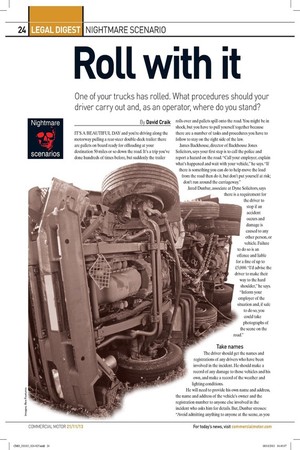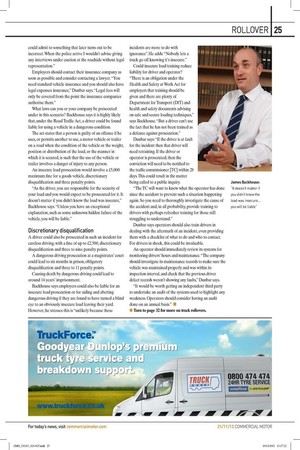Roil with it
Page 18

Page 19

If you've noticed an error in this article please click here to report it so we can fix it.
One of your trucks has rolled. What procedures should your driver carry out and, as an operator, where do you stand? By David Craik IT'S A BEAUTIFUL DAY and you're driving along the motorway pulling a rear-steer double-deck trailer: there are pallets on board ready for offloading at your destination 50 miles or so down the road. It's a trip you've done hundreds of times before, but suddenly the trailer
rolls over and pallets spill onto the road. You might be in shock, but you have to pull yourself together because there are a number of tasks and procedures you have to follow to stay on the right side of the law. James Backhouse, director of Backhouse Jones Solicitors, says your first step is to call the police and report a hazard on the road. "Call your employer, explain what's happened and wait with your vehicle," he says. "If there is something you can do to help move the load from the road then do it, but don't put yourself at risk;
don't run around the carriageway." Jared Dunbar, associate at Dyne Solicitors, says there is a requirement for the driver to stop if an accident occurs and damage is caused to any other person, or vehicle. Failure to do so is an offence and liable for a fine of up to £5,000. "I'd advise the driver to make their way to the hard
shoulder," he says. "Inform your employer of the situation and, if safe to do so, you could take photographs of
the scene on the road." Take names The driver should get the names and registrations of any drivers who have been involved in the incident. He should make a record of any damage to those vehicles and his own, and make a record of the weather and
lighting conditions. He will need to provide his own name and address, the name and address of the vehicle's owner and the registration number to anyone else involved in the incident who asks him for details. But, Dunbar stresses: "Avoid admitting anything to anyone at the scene, as you
could admit to something that later turns out to be incorrect. When the police arrive I wouldn't advise giving any interviews under caution at the roadside without legal representation."
Employers should contact their insurance company as soon as possible and consider contacting a lawyer. "You need standard vehicle insurance and you should also have legal expenses insurance," Dunbar says. "Legal fees will only be covered from the point the insurance companies authorise them."
What laws can you or your company be prosecuted under in this scenario? Backhouse says it is highly likely that, under the Road Traffic Act, a driver could be found liable for using a vehicle in a dangerous condition.
The act states that a person is guilty of an offence if he uses, or permits another to use, a motor vehicle or trailer on a road when the condition of the vehicle or the weight, position or distribution of the load, or the manner in which it is secured, is such that the use of the vehicle or trailer involves a danger of injury to any person.
An insecure load prosecution would involve a £5,000 maximum fine for a goods vehicle, discretionary disqualification and three penalty points.
"As the driver, you are responsible for the security of your load and you would expect to be prosecuted for it. It doesn't matter if you didn't know the load was insecure," Backhouse says. "Unless you have an exceptional explanation, such as some unknown hidden failure of the vehicle, you will be liable." Discretionary disqualification
A driver could also be prosecuted in such an incident for careless driving, with a fine of up to £2,500, discretionary disqualification and three to nine penalty points.
A dangerous driving prosecution at a magistrates' court could lead to six months in prison, obligatory disqualification and three to 11 penalty points.
Causing death by dangerous driving could lead to around 14 years' imprisonment. Backhouse says employers could also be liable for an insecure load prosecution or for aiding and abetting dangerous driving if they are found to have turned a blind eye to an obviously insecure load leaving their yard. However, he stresses this is "unlikely because these
incidents are more to do with ignorance': He adds: "Nobody lets a truck go off knowing it's insecure."
Could insecure load training reduce liability for driver and operator? "There is an obligation under the Health and Safety at Work Act for employers that training should be given and there are plenty of Department for Transport (DfT) and health and safety documents advising on safe and secure loading techniques," says Backhouse. "But a driver can't use the fact that he has not been trained as a defence against prosecution."
Dunbar says: "If the driver is at fault for the incident then that driver will need retraining. If the driver or operator is prosecuted, then the conviction will need to be notified to the traffic commissioner [TC] within 28 days. This could result in the matter being called to a public inquiry.
"The TC will want to know what the operator has done since the accident to prevent such a situation happening again. So you need to thoroughly investigate the cause of the accident and, in all probability, provide training to drivers with perhaps refresher training for those still struggling to understand."
Dunbar says operators should also train drivers in dealing with the aftermath of an incident, even providing them with a checklist of what to do and who to contact. For drivers in shock, this could be invaluable.
An operator should immediately review its systems for monitoring drivers' hours and maintenance. "The company should investigate its maintenance records to make sure the vehicle was maintained properly and was within its inspection interval, and check that the previous driver defect records weren't showing any faults," Dunbar says. "It would be worth getting an independent third party to undertake an audit of the systems used to highlight any weakness. Operators should consider having an audit done on an annual basis." •
• Turn to page 32 for more on truck rollovers.






































